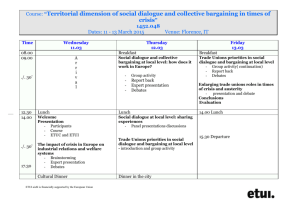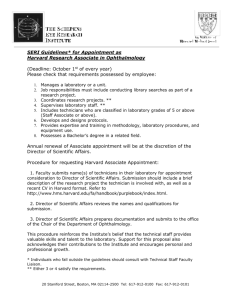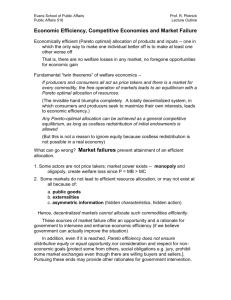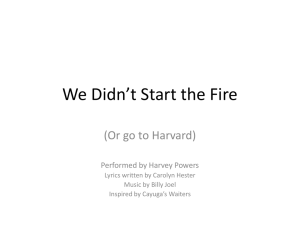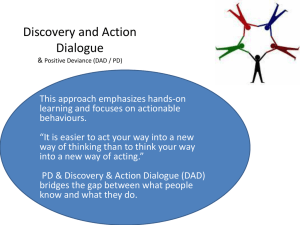Teaching with Case Studies
advertisement
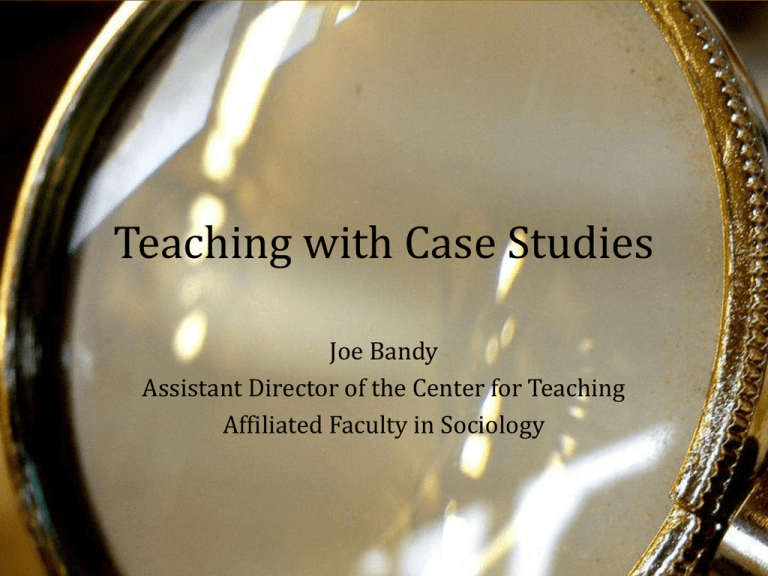
Teaching with Case Studies Joe Bandy Assistant Director of the Center for Teaching Affiliated Faculty in Sociology The Melian Dialogue Debrief • What did you notice about our discussion of the Melian case? One Word Student Reflections Enigma, collaborative, interesting, pressed, inventive, wow, provoking, pessimistic, frustration, proud, difficult, helpless, idealistic, catch-22, resist, struggle, liberation, reality, confusion, courage, bravery, enlightening, intriguing, illuminating, wondrous, awkward, overwhelming, unsolvable, enthralling, unfinished, ambitious, intense, infinite, complex, exciting, invigorating, refreshing, intimidating, uncomfortable, thoughtful, fun, touching, intractable, inspiring, sad Defining Case Studies 1. 2. 3. 4. Complex, real world scenarios Supporting information Open-ended problems Prompts and questions Defining Case Studies • Focus – Descriptive or illustrative – Decision or action oriented – Debates – Simulations or games • Lengths – Long form narratives or simulations – Short-form cases – Minicases – Bullet cases Impact Bloom’s Taxonomy, revised Impact • • • • • • • Affective learning Self-direction Responsibility for learning Oral presentation Communication Cooperation Citizenship Authentic & Engaging Problems Inquiry based learning “…careful inspection of methods which are permanently successful in formal education… will reveal that they depend for their efficiency upon the fact that they go back to the type of situation which causes reflection out of school in ordinary life…. They give the pupil something to do, not something to learn, and the doing is of such a nature as to demand thinking.” John Dewey, Democracy and Education. 1916 Active, social learning “…the students strive to resolve questions that have no single right answer. Their differing views and approaches produce a creative tension that fuels the enterprise and a synergistic outcome that both recognizes and exceeds their individual contributions. In their effort to find solutions and reach decisions through discussion, they sort out factual data, apply analytical tools, articulate issues, reflect on their relevant experience, and draw conclusions they can carry forward to new situations. – Boehrer, J. and M. Linsky. “Teaching with Cases: Learning to Question.” In M.D. Svinicki (ed.), The Changing Face of College Passive Learning Active Learning Receive ideas Offer ideas Answer questions Raise questions Hearing analyses Making analyses Examining texts Engaging texts Accepting assumptions Challenging assumptions Faculty-Student dialogue Student-Student dialogue Faculty locus Student locus Case Teaching Methods • Clarify objectives • Plan and Prepare • Organize discussion – Small teams – Clear project goals – Clear roles – Clear schedule for writing, presentations Case Teaching Methods • Discussion – Disclose context – Questioning to explore relevant angles • Analysis of the problem • Application of theory – – – – – – Listening carefully, paraphrasing Capturing positions and suggested actions Clarification of debates - differences, compromises Next steps for research, discussion, action Lessons Evaluation Case Teaching Methods • Writing cases – – – – – – Backwards design Open ended, no one right answer Presents enough information for analysis Presents, not evaluates problem Allows for multiple realistic positions Use and edit • Student cases – Experience with cases in class – Heightens benefits of case teaching – Best cases Case Sites • Science – National Center for Case Study Teaching in Science • Engineering and Material Sciences – Online Ethics Center for Engineering and Research – UK Centre for Materials Education • Business – Harvard Business School – University of Washington, Evans School of Public Affairs Case Sites • Political Science or Policy – Harvard University John F. Kennedy School of Government, Case Studies in Public Policy & Management – McGill University Peacebuilding Simulation – University of Washington, Evans School of Public Affairs • Other social sciences – Harvard University John F. Kennedy School of Government, Case Studies in Public Policy & Management – University of California, Santa Barbara Case List • History – Women in World History, Teaching Case Studies • Multiculturalism and diversity – Online Ethics Center – U of Minnesota, Hubert H. Humphrey School of Public Affairs, Center on Women and Public Policy Discussion Think of a course and a potential lesson for which you might like to teach a case study. What benefits and challenges do you foresee? If you already teach using the case method, how might you enhance your use of it? Discussion

